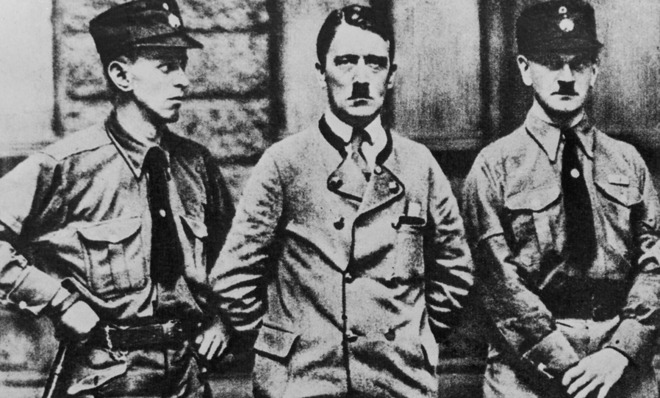In defense of Nazi analogies
Most of them are lazy and bad. But that doesn't mean we should ban them all.


If there's any cliché more tired than the Nazi analogy, it might be the claim that making a Nazi analogy in a public debate automatically disqualifies your argument.
Known as Godwin's Law, this rule states that in any discussion, the probability of a Nazi analogy being made eventually reaches 1, provided the conversation continues indefinitely. Godwin's Law was originally merely descriptive. But nowadays, if you prove Godwin's Law true by invoking Hitler or the Nazis, your argument is suddenly viewed as ipso facto risible. That shouldn't be the case.
Let me immediately concede this point: Yes, people make all sorts of bad Nazi analogies all the time. Bad analogies are bad, and bad analogies should always be derided as bad.
The Week
Escape your echo chamber. Get the facts behind the news, plus analysis from multiple perspectives.

Sign up for The Week's Free Newsletters
From our morning news briefing to a weekly Good News Newsletter, get the best of The Week delivered directly to your inbox.
From our morning news briefing to a weekly Good News Newsletter, get the best of The Week delivered directly to your inbox.
But not all Nazi analogies are bad. In fact, many Nazi analogies are a good part of public discourse.
Nazism is the single most awful ideology ever vomited out of the bowels of our pestilential human history. With its racism, its genocidal mania, and its apocalyptically relentless violence, Nazism remains a unique distillation of human evil, the devil's masterpiece.
It makes perfect sense that the most totemic example of evil in human history would get a lot more mentions than the various runners-up. When we try to give examples of goodness, we evoke Mother Teresa and Gandhi, not sort-of-nice chaps.
What's more, the totemic nature and frequent invoking of Nazism ensures that its firm status as the greatest evil ever is reinforced. Given the alarming rise of anti-Semitism in many parts of the world, the fact that there can be little doubt about polite society's revulsion toward Nazism is reassuring.
A free daily email with the biggest news stories of the day – and the best features from TheWeek.com
And here's another reason Nazi analogies aren't always bad: Some things actually are like Nazism.
The 1938 Munich debacle really is an example of what happens when the civilized world puts cowardice ahead of principle, and a cautionary tale of the dangers — and immorality — of appeasement. Does that mean we need to let slip the dogs of war whenever a tin-pot dictator blows his nose? Of course not. But Munich was not a sui generis event, and to a priori dismiss any comparison of any situation to Munich as faulty simply because it's compared to Munich is ridiculous.
For example, Stalin's blockade of West Berlin was clearly a "Munich moment" — a moment of truth in which a totalitarian leader made clear his intent to grab as much of the world as he could, and in which civilized nations could either stand firm or invite a domino effect; and one can't help but think that the freshness of the memory of 1938 steeled the West's resolve.
Similarly, it's hard not to think of the Nazi program of eugenics and Nazism's deranged view of the perfectibility of human nature when one reads the works of people like Joseph Fletcher, hailed as a "pioneer of medical ethics" in his New York Times obituary, who openly advocated the forced sterilization of the "unfit" and abortion of "defective" pregnancies.
Some things are like Nazism, or remind us of Nazism, even if they are not exactly Nazism.
Again — bad analogies are bad. But not all Nazi analogies are bad analogies. And a wholesale ban on Hitler comparisons doesn't do the world any favors.
And if you disagree, it must mean you're worse than Hitler.
Pascal-Emmanuel Gobry is a writer and fellow at the Ethics and Public Policy Center. His writing has appeared at Forbes, The Atlantic, First Things, Commentary Magazine, The Daily Beast, The Federalist, Quartz, and other places. He lives in Paris with his beloved wife and daughter.
-
 Trump’s ‘Board of Peace’ comes into confounding focus
Trump’s ‘Board of Peace’ comes into confounding focusIn the Spotlight What began as a plan to redevelop the Gaza Strip is quickly emerging as a new lever of global power for a president intent on upending the standing world order
-
 ‘It’s good for the animals, their humans — and the veterinarians themselves’
‘It’s good for the animals, their humans — and the veterinarians themselves’Instant Opinion Opinion, comment and editorials of the day
-
 The world is entering an era of ‘water bankruptcy’
The world is entering an era of ‘water bankruptcy’The explainer Water might soon be more valuable than gold
